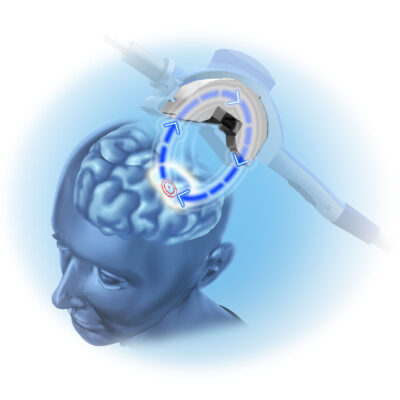Magnet Therapy Brings Help to People with Depression
Today Show


Helio.com Almost 40% of veterans with major depressive disorder who were previously treatment-resistant achieved symptom remission with repetitive transcranial magnetic stimulation, data published in JAMA Psychiatry showed. “New [treatment-resistant MDD] treatments are needed, preferably without major safety concerns or adverse effects as seen with aggressive polypharmacy or [electroconvulsive therapy],” Jerome A. Yesavage, MD, of the department of psychiatry and behavioral sciences, […]

Daniel M Blumberger 1, Fidel Vila-Rodriguez 2, Kevin E Thorpe 3, Kfir Feffer 4, Yoshihiro Noda 5, Peter Giacobbe 6, Yuliya Knyahnytska 7, Sidney H Kennedy 8, Raymond W Lam 9, Zafiris J Daskalakis 10, Jonathan Downar 11 Background: Treatment-resistant major depressive disorder is common; repetitive transcranial magnetic stimulation (rTMS) by use of high-frequency (10 Hz) left-side dorsolateral prefrontal cortex stimulation is an evidence-based treatment for this disorder. Intermittent theta burst stimulation (iTBS) is a newer form […]

Romain Duprat 1, Stefanie Desmyter 2, De Raedt Rudi 3, Kees van Heeringen 2, Dirk Van den Abbeele 2, Hannelore Tandt 2, Jasmina Bakic 3, Gilles Pourtois 3, Josefien Dedoncker 1, Myriam Vervaet 2, Sara Van Autreve 2, Gilbert M D Lemmens 2, Chris Baeken 4 Affiliations expand Abstract Although accelerated repetitive Transcranial Magnetic Stimulation (rTMS) paradigms and intermittent Theta-burst Stimulation (iTBS) may have the potency to result in superior clinical outcomes in Treatment Resistant Depression (TRD), accelerated iTBS treatment has […]

Paul B Fitzgerald 1 2, Kate E Hoy 3, David Elliot 3, R N Susan McQueen 3, Lenore E Wambeek 3, Zafiris J Daskalakis 4 Affiliations expand Free PMC article Abstract Repetitive transcranial magnetic stimulation (rTMS) is increasingly used clinically in the treatment of patients with major depressive disorder (MDD). However, rTMS treatment response can be slow. Early research suggests that accelerated forms of rTMS may be effective […]

Eleanor J Cole 1, Angela L Phillips 1, Brandon S Bentzley 1, Katy H Stimpson 1, Romina Nejad 1, Fahim Barmak 1, Clive Veerapal 1, Naushaba Khan 1, Kirsten Cherian 1, Emily Felber 1, Randi Brown 1, Elizabeth Choi 1, Sinead King 1, Heather Pankow 1, James H Bishop 1, Azeezat Azeez 1, John Coetzee 1, Rachel Rapier 1, Nicole Odenwald 1, David Carreon 1, Jessica Hawkins 1, Maureen Chang 1, Jennifer Keller 1, Kristin Raj 1, Charles DeBattista 1, Booil Jo 1, Flint M Espil 1, Alan F Schatzberg 1, Keith D Sudheimer 1, Nolan R Williams 1 Affiliations expand Abstract Objective: Depression is the leading cause of disability worldwide, and half of patients with […]

Mark A Demitrack 1, Michael E Thase Transcranial magnetic stimulation (TMS) is a novel treatment for patients with major depressive disorder. Although clearly safer and better tolerated than many other pharmacotherapeutic options or electroconvulsive therapy, questions have persisted about the magnitude of the efficacy of TMS in patients with pharmacoresistant depression, and the clinical significance of these […]

Philip G Janicak 1, David L Dunner, Scott T Aaronson, Linda L Carpenter, Terrence A Boyadjis, David G Brock, Ian A Cook, Karl Lanocha, Hugh B Solvason, Dafna Bonneh-Barkay, Mark A Demitrack Abstract Background: Transcranial magnetic stimulation (TMS) is an effective and safe therapy for major depressive disorder (MDD). This study assessed quality of life (QOL) and functional status outcomes for depressed patients after an acute course […]

Monitoring Editor: Alexander Muacevic and John R Adler Sukaina Rizvi1 and Ali M Khan2 Prefrontal TMS therapy repeated daily for four to six weeks is a neuromodulation technique approved by the US Food and Drug Administration for the treatment of major depressive disorder (MDD) in patients resistant to medications. This technique utilizes electromagnetic induction to excite neuronal […]

Harold A. Sackeim, Ph.D., Joan Prudic, M.D., Mitchell S. Nobler, M.D., Linda Fitzsimons, R.N., Sarah H. Lisanby, M.D., Nancy Payne, C.S.W., Robert M. Berman, M.D., Ph.D., Eva-Lotta Brakemeier, M.A., Tarique Perera, M.D., and D. P. Devanand, M.D. While electroconvulsive therapy (ECT) in major depression is effective, cognitive effects limit its use. Reducing the width of the electrical pulse and using the right unilateral electrode […]

Aditya Somani1,* and Sujita Kumar Kar2 National Library of Medicine Depression is a common mental disorder, which attributes to significant morbidity, disability and burden of care. A significant number of patients with depression still remain symptomatic after adequate trials of antidepressant treatment as well as psychotherapy, which is often referred to as treatment-resistant depression. Neuromodulation techniques—like electroconvulsive […]

October 27, 2020 By Adam P. Stern, MD, Contributor Harvard Health Publishing Depression is the leading cause of disability in the United States among people ages 15 to 44. While there are many effective treatments for depression, first-line approaches such as antidepressants and psychotherapy do not work for everyone. In fact, approximately two-thirds of people with depression don’t […]